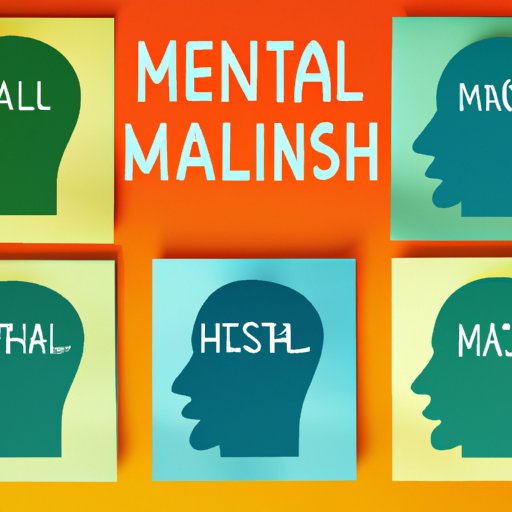
Introduction
Mental health is a critical component of overall health and well-being, yet it is often mired in negative stigma and misconceptions. Many people view mental health issues as a personal failing rather than a societal concern. However, research shows that social factors and determinants have a significant impact on mental health outcomes. In this article, we will explore the complex relationship between mental health and social issues, and delve into why it’s important for society to prioritize mental health promotion and treatment.
The Connection Between Social Factors and Mental Health: A Comprehensive Analysis
Mental health outcomes are linked to various social factors, including income, education, employment, housing, and social support. For instance, individuals with lower incomes are more likely to experience poor mental health outcomes due to stress and a lack of resources for treatment. Similarly, those who lack adequate housing may experience mental health problems due to the instability and uncertainty of their living situations. Moreover, social support is a crucial component of mental health, with research showing that individuals who have strong social ties are less likely to experience mental health problems.
Social Determinants of Mental Health and the Need for Collective Action
Many social determinants of health, such as poverty, inequality, and discrimination, can lead to mental health problems. For instance, marginalized communities may experience chronic stress and trauma due to systemic discrimination and limited access to resources, leading to higher rates of mental illness. Addressing underlying social issues is crucial to promoting positive mental health outcomes, as mental health is not just an individual concern but a collective one. Therefore, promoting collective action is necessary to address the root causes of mental health disparities.
How Stigma and Discrimination Affect Mental Health in Society
Stigma and discrimination remain major barriers to mental health treatment and recovery. Many individuals with mental health issues face discrimination in various settings, such as employment and healthcare. This discrimination, coupled with the negative stigma surrounding mental illness, can prevent people from seeking help and lead to more severe mental health problems. It is crucial to challenge these misconceptions and promote mental health advocacy and education to break down these barriers.
Exploring the Relationship Between Social Support and Mental Health
Research shows that social support is essential to promoting mental health and reducing the risk of mental illness. Social support can come in various forms, such as family, friends, and community organizations. Moreover, peer support groups and support hotlines have been effective in providing much-needed emotional support and resources for individuals who may not have access to other forms of support.
Social Isolation and Its Impact on Mental Health – Why We Need to Address the Root Cause
Social isolation can lead to negative mental health outcomes, such as depression, anxiety, and cognitive decline. Many factors contribute to social isolation, including geographic location, mobility restrictions, and social exclusion. Additionally, individuals who experience discrimination due to their identities may feel alienated and isolated from their communities. Addressing the root causes of social isolation is crucial to promoting mental health and well-being for all individuals.
Breaking Down the Barriers: How Communities Can Work Together to Support Mental Health and Well-being
Many communities have taken steps to support mental health and well-being through promoting education and awareness, advocacy, and providing resources for individuals who may be struggling. Peer support groups, anti-stigma campaigns, and community-based mental health programs have all been successful in promoting resilience and recovery in individuals with mental health issues. Moreover, individuals can take action through volunteering, advocating for policy change, and spreading awareness about mental health issues.
Conclusion
Mental health is a crucial concern for society as a whole, and addressing the social factors that impact mental health is essential to promoting positive outcomes. Stigma, social determinants, and lack of resources all contribute to mental health disparities, and promoting collective action is vital to addressing these issues effectively. By prioritizing mental health education and advocacy, supporting social support systems and resources, and challenging negative stereotypes, we can work towards a society that prioritizes mental health and well-being for all individuals.





